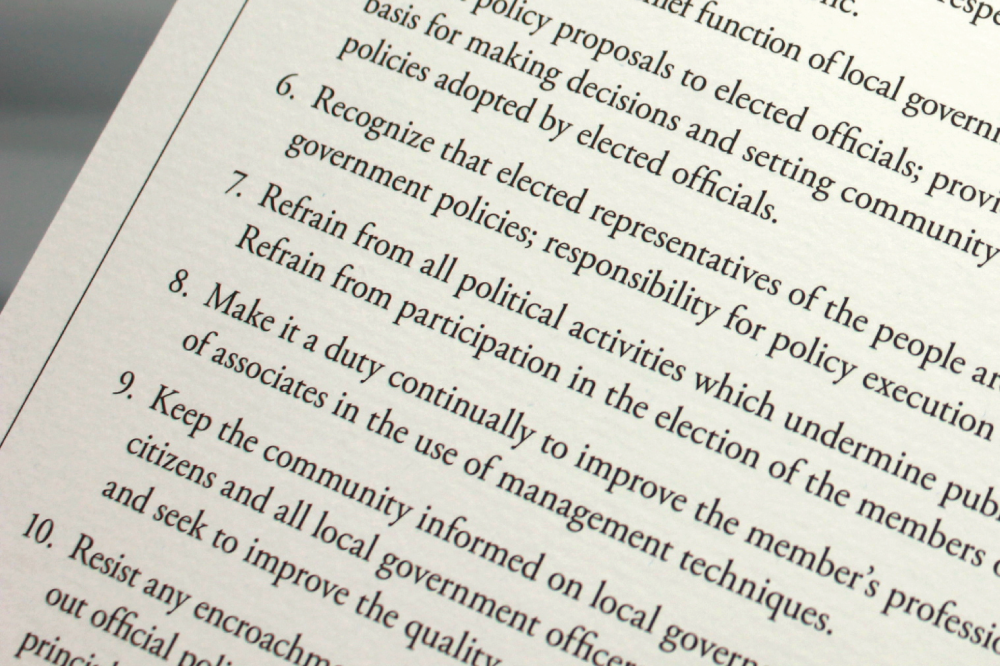
ICMA is committed to ensuring that the Code of the Ethics is responsive to the challenges members encounter in today’s complex local government environment, just as was intended when ICMA members originally adopted the Code in 1924. Five years ago, the Committee on Professional Conduct (CPC) began the collaborative effort of working with members to focus on reviewing each of the 12 tenets, an endeavor that will continue until each tenet has been studied. Revising the Code is essential, especially because ICMA’s membership today is far broader than it was in 1924, encompassing professionals who work in a variety of positions across local governments.
This year we focused on Tenet 4, which was first added to the Code in 1952, stating: "The city manager keeps the community informed on municipal affairs. He emphasizes friendly and courteous service to the public. He recognizes that the chief function of the local government at all times is to serve the best interests of all the people on a non-partisan basis."
In 1972, the language was simplified: “Recognize that the chief function of local government at all times is to serve the best interests of all of the people.” The importance of keeping the community informed was not deleted from the Code--the emphasis on a duty to communicate with the public, along with providing effective and courteous service, are now reflected in Tenet 9.
The Tenet 4 guideline on length of service was added in 1972 and has remained untouched. ICMA fields questions from members who struggle to determine whether their specific situation creates an exception to the guideline, and about 10 percent of ethics cases coming before the CPC involve short tenures.
Members provided invaluable feedback on the relevancy of Tenet 4 at the regional conferences, various state and affiliate association meetings, and through an online survey and discussion board. More than 1,600 members responded to the survey alone, providing over 1,400 written comments. Results indicated members supported changing the language of Tenet 4, the additions of guidelines to address inclusion and equity, and the proposal to limit the two-year tenure guideline to chief administrative officers.
Based on member feedback, the board approved placing new tenet language on the May 2018 ballot. Members overwhelmingly approved the new tenet language.
In June, the board approved new guidelines on inclusion and equity in order to give more direction and guidance on how to implement the principles outlined in Tenet 4. The board also approved amendments to the length of service guideline to limit the requirement to serve two years to chief administrative officers. In reaching this decision, the board also encourages all members to honor their employment commitments. Lastly, the board determined that the length of service guideline related more to the professional commitment to integrity as outlined in Tenet 3.
Here are the revisions and new guidelines:
Length of Service Guideline under Tenet 3. For chief administrative/executive officers appointed by a governing body or elected official, a minimum of two years is considered necessary to render a professional service to the local government. In limited circumstances, it may be in the best interests of the local government and the member to separate before serving two years. Some examples include refusal of the appointing authority to honor commitments concerning conditions of employment, a vote of no confidence in the member, or significant personal issues. It is the responsibility of an applicant for a position to understand conditions of employment, including expectations of service. Not understanding the terms of employment prior to accepting does not justify premature separation. For all members, a short tenure should be the exception rather than a recurring experience, and members are expected to honor all conditions of employment with the organization.
Tenet 4. Serve the best interests of the people.
GUIDELINES
Impacts of Decisions. Members should inform their governing body of the anticipated effects of a decision on people in their jurisdictions, especially if specific groups may be disproportionately harmed or helped.
Inclusion. To ensure that all the people within their jurisdiction have the ability to actively engage with their local government, members should strive to eliminate barriers to public involvement in decisions, program, and services.
New, Reduced Membership Dues
A new, reduced dues rate is available for CAOs/ACAOs, along with additional discounts for those in smaller communities, has been implemented. Learn more and be sure to join or renew today!
